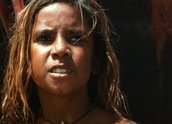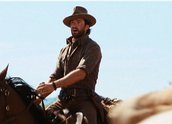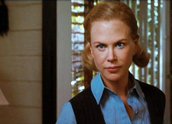


Australia (2008)
Synopsis
In 1939 English aristocrat Lady Sarah Ashley (Nicole Kidman) travels to Faraway Downs, a cattle station in the Northern Territory owned by her husband, Maitland (Anton Monsted). When she arrives, Maitland is dead. Blamed for his murder is King George (David Gulpilil), an Aboriginal magic man whose half-caste grandson, Nullah (Brandon Walters), lives at Faraway Downs and fears being taken away to a mission home. Lady Sarah dismisses station manager Neil Fletcher (David Wenham) after Nullah tells her Fletcher killed Maitland and is working for ruthless cattle baron King Carney (Bryan Brown). To win an army supply contract that will prevent her property from falling into Carney’s hands, Lady Sarah must drive her livestock hundreds of kilometres north to Darwin.
She enlists the help of the Drover (Hugh Jackman), an experienced stockman who worked for Maitland. With Nullah and other Faraway Downs staff joining the drive and King George keeping watch from afar, Lady Sarah and the Drover bring the cattle to Darwin. Waiting for them is Fletcher, who has assumed control of Carney’s empire following his death in a crocodile attack. Threatening to separate her from Nullah, Fletcher presses Lady Sarah to part with Faraway Downs. In love with the Drover and determined to protect Nullah, she refuses. As Nullah and King George are taken away by authorities, Japanese bombers launch a devastating raid on Darwin.
Curator’s notes
Australia is one of those historical romantic melodramas that from time to time manage to capture the public imagination partly because 'they don’t make them like that anymore’. Very much in the tradition of outdoor adventures such as Gone With the Wind (1939), Giant (1956), Once Upon a Time in the West (1968), Out of Africa (1985) and Pearl Harbor (2001), Australia is without doubt the biggest, most luxurious and most expensive (at USD $130 million) Australian film made to date. Many big budgeters have been filmed Down Under (including The Matrix trilogy, 1999-2003, and Superman Returns, 2006), but prior to Australia local audiences had never witnessed an Australian story on such a grand scale.
Filmmaker Baz Luhrmann is a showman dedicated to giving audiences their money’s worth and whatever criticisms might be levelled at Australia there is no denying he has put the money right up there on screen. From the magnificent aerial photography of Faraway Downs (see clip one), to the cattle drive (see clip two), a spectacular bombing of Darwin, and the superb production design by Catherine Martin, Australia does not disappoint visually.
Where it does fall somewhat short of the mark is the tone adopted in the first couple of reels. In particular, Lady Sarah Ashley arrives as an over-the-top caricature of British aristocracy who would seem more at home in the razzle-dazzle swirl of Luhrmann’s Moulin Rouge! (2001) than the dusty outback where half-caste Aboriginal children such as Nullah live in constant fear of being taken away. The Drover also gets off to a rather wobbly start, coming across more like a 1930s Crocodile Dundee than the rugged adventurer type with a heart beneath all that brawn. The mix of slightly campy fish-out-of-water melodrama and serious social issues sits uncomfortably until a tragic incident involving Nullah at the 40-minute mark. In its wake Lady Sarah and the Drover become much more three-dimensional characters and the film, rather like a car that needs a grease and oil change to get going, shifts up several very satisfying gears. From the cattle drive north to the bombing of Darwin and Nullah’s removal to a mission home, Australia delivers adventure, romance, action and despicable villainy from Fletcher (see clip three) in pretty impressive style.
Once they hit the right groove Kidman and Jackman are fine as the opposites who inevitably attract, but the real trump in the acting deck is Brandon Walters. The story is told through Nullah’s eyes (see clip one), and even when it hits bumpy spots the wonderfully natural performance of this gifted young performer carries the day. His relationship with grandfather King George, and the bond he forms with 'Mrs Boss’ and the Drover, who come to love him like a son, powerfully brings to light the shameful practice (which ended, incredibly, only in 1973) of removing half-caste children from their mothers and 'breeding the black out of them’ at church-run mission homes. While the magical powers attributed to King George seem a little arbitrary at times, there is no doubting the sincerity of the filmmakers in relation to Aboriginal matters.
As Australia’s first genuine mega-budget 'event’ picture, Australia was released locally amid considerable fanfare in November 2008. Doomsayers predicting a financial disaster were quickly put in their place when the film grossed $36.8 million, making it the second-highest Australian film ever at the domestic box office (Crocodile Dundee, 1985, still rules with $47.7 million). Though it didn’t quite deliver the big numbers hoped for in the US, Australia grossed a very impressive USD $211 million worldwide (source: Box Office Mojo) before DVD and other ancillary sales. Like most of Luhrmann’s films, it didn’t please all the critics but the public embraced this big, bold, larger-than-life entertainment spectacular.
Australia was released in Australian cinemas on 26 November 2008. It was nominated for eight AFI Awards in 2009: Supporting Actor and Young Actor (both Brandon Walters), Original Music (David Hirschfelder, Felix Meagher, Baz Luhrmann, Angela Little), Sound (Andy Nelson, Anna Behlmer, Wayne Pashley MPSE, Guntis Sics, Simon Leadley), and the Members’ Choice Award for Best Film; it won the prizes for Best Production Design (Catherine Martin, Ian Gracie, Karen Murphy, Beverley Dunn), Costume Design (Catherine Martin, Eliza Godman) and Visual Effects (Chris Godfrey, James E Price, Andy Brown, Rob Duncan).
Secondary curator’s notes
by Liz McNivenFilm is the closest thing to a lived experience. It influences our perspectives, our way of seeing ourselves and our place in the world. In Australia, you feel the pain of racism, discrimination and injustice and experience the triumphant power of forbearance, fortitude and unity. Baz Luhrmann serves the nation well in redefining the spirit of Australia through this visually sensational piece of storytelling.
This is our Wizard of Oz (1939) story, our journey as a nation down the yellow brick road. Lodged deep in the backblocks of Australia lies the Northern Territory, and deep in the Australian psyche lie stories about our shared past. Australia opens the door to these stories in a dramatically refreshing and enthralling way. Each character in the film represents a dimension of our national psyche. Like the characters in the film, Australia the nation needs to look inside itself; to find its heart, its brain, its courage in order to truly have a place in this beautiful sacred land.
An epic in Australian cinema, Australia goes a long way in reframing the white narrative in this country. It provides an alternative by repositioning relationships and showing the interconnections between the peoples who inhabit a shared history. It makes Australians accountable as a nation and as individuals. It gives us the right and the reason to stand, even if against the greatest odds, for truth and equality.
The tense and violently charged relationship between Fletcher (David Wenham) and Nullah (Brandon Walters) reflects the relationship between white Australia and Aboriginal peoples. It shows a harsh reality of rejection, abuse, denial and outright brutality. The film doesn’t represent Fletcher in a dehumanising way or Nullah as a victim. Quite the opposite: it exposes Fletcher’s insecurity, vulnerability and sense of powerlessness as compared to Nullah’s belief in himself, his people, his culture and the future.
Like a hungry ghost with an unquenchable appetite, Fletcher hungers for power and status, but enough is never enough. 'Pride is not power’ he tells Lady Sarah Ashley (Nicole Kidman), until he finally learns this lesson himself. The film provides a comparison between the temporary nature of external power and the internal power of love, courage and determination.
Nullah, Lady Sarah Ashley and the Drover (Hugh Jackman) represent a new pathway for Australia, one that leads to a place with a sense of belonging. A just and equitable Australia that believes in itself, acknowledges its history and shares its knowledge, power and resources equally.
David Gulpilil’s first screen role in Walkabout (1970) sees him as a 15-year-old boy starting out on the road to manhood. Now, 40 years later, this legend of Australian cinema plays King George, an Aboriginal Elder and statesman who holds ancient custodial knowledge and wisdom about the natural and spiritual worlds. He is the 'wizard of Aus’.
Brandon Walter’s commanding performance as Nullah highlights an ascending star shining brightly beside internationally acclaimed actors Nicole Kidman, Hugh Jackman and David Gulpilil. This experience may serve to launch a successful long-term career for him in Australian cinema.
- Overview
- Curator’s notes
- Video 3 clips
- Principal credits
- Find a copy
- Make a comment
- Map
- Extras
- Add your review




